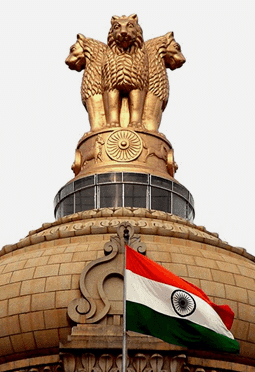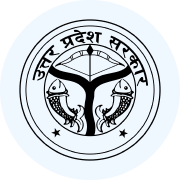Revision Notes: Centre-State Relations | Environment & Social Studies for Super TET PDF Download
Legislative Relations
The Parliament can make laws for the whole or any part of the territory of India, while the State legislature can legislate for the whole or any part of the State.
As regards the subjects of legislation, three-fold distribution of legislative powers between Union and States is envisaged and listed in the Schedule VII.
 National Emblem of India
National Emblem of India
List I or the Union List includes 97 subjects over which the Union has exclusive power of legislation. The subjects include defence, foreign affairs, banking, currency and coinage, communication, atomic energy, etc.
List II or the State List comprise 66 items over which the state Legislature has exclusive power of legislation. The subjects include public order and police, local government, prisons, public health and sanitation, agriculture, fisheries, State taxes and duties, betting and gambling, money-lending, fairs and market, capitation taxes, tolls, treasure trove, gas and gasworks, inns etc.
List III or the Concurrent List gives the subjects on which both Parliament and State Legislature can legislate.The 47 subjects include criminal law and procedure, civil procedure, marriage, contracts, torts, trusts, welfare of labour, economic and social planning, forests, trade unions, family welfare, vital statistics (births etc.), price control, factories, boilers, electricity, education, drugs, newspapers, books and printing presses, etc.
In case of a matter overlapping between the three Lists, predominance has been given to the Union Legislature. However, if a law passed by the State Legislature has received Presidential assent before the enactment of a law on the same subject by Parliament, the Sate law prevails.
But it would still be within Parliament’s power to override such State law by subsequent legislation. The residual power under Constitution (i.e., subjects not included in any of the Lists) is vested in the Union Legislature (Article 248). Whether a particular matter falls under the residuary power or not is finally determined by the Courts.
There are certain circumstances under which the above system of distribution is either suspended or Parliament's power is extended over State subjects.
- Parliament has the power to legislate on a state subject if the Rajya Sabha passes a resolution by two-third majority that it is in the national interest to do so. The resolution remains in force for a period not exceeding one year. The operation of the law can be extended by one year. The law thus passed by Parliament ceases to be operative on the expiration of six months after the resolution has ceased to have force (Article 249).
- During times of emergency, Parliament can make laws on subjects in the State List. However, such a law ceases to have effect on the expiration of a period of six months after the proclamation has ceased to operate (Article 250).
- Parliament can also make laws with respect to any subject on the State List if the Legislature of two or more States resolve that is shall be lawful for Parliament to do so (Article 252).
- Parliament has the power to legislate on a State subject for the implementation of treaties or international agreements and conventions (Article 253).
Administrative Relations
The States are, moreover, expected to comply with laws made by Parliament and are not to impede the exercise of the executive power of the Union. The Union can issue directions to the State regarding the construction and maintenance of communications of national or military importance.
It can also give instruction to State government for the protection of railways. The President may entrust officers of the States certain executive function of the Union relating to any matter. Extra costs will be met by the Union Government (Article 257). The Supreme Court and High Court judges are appointed by the President; so is Governor. The removal of these officials also rests with the Union.
The President is empowered to establish an Inter State Council if at any time it appears to him that public interest would be served by it (Article 263). The functions envisaged by the Constitution for such a council are the duty of inquiring into and advising upon disputes which may have arisen between States, investigate and discuss subjects of common interest between the Union and States.
Financial Relations
Parliament can levy taxes on the subjects included in the Union List. The State can levy taxes on the subjects in the State List. Ordinarily, there are no taxes on the subjects in the Concurrent List. In the financial sphere too the Centre is better equipped. The States are greatly dependent on the Centre for finances.
The Centre can exercise control over State finances through the Comptroller and Auditor-General of India and grants (general and special) in aid.
But during financial emergency the President has the power to suspend the provisions regarding division of taxes between the Centre and the States. He can also impose various other restraints on the expenses of the State.
|
205 videos|283 docs|68 tests
|
FAQs on Revision Notes: Centre-State Relations - Environment & Social Studies for Super TET
| 1. What are the main features of the Centre-State relations in India? |  |
| 2. What is the significance of the Article 356 of the Indian Constitution in Centre-State relations? |  |
| 3. How does the Inter-State Council contribute to Centre-State relations in India? |  |
| 4. How does the Goods and Services Tax (GST) impact Centre-State relations in India? |  |
| 5. What are the Constitutional provisions for resolving disputes between the Centre and the states in India? |  |
|
205 videos|283 docs|68 tests
|

|
Explore Courses for Super TET exam
|

|


















